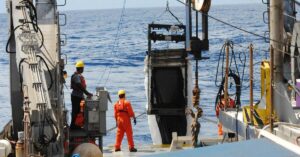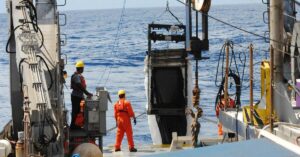
U.S. Navy Strikes Another Boat Off Venezuelan Coast, Russia Condemns Action
October 6, 2025
Qatar Orders Ships To Temporarily Stop Navigation After Sudden GPS Failure
October 6, 2025

India has emerged as one of the top three global suppliers of trained seafarers, with its workforce now exceeding three lakh, according to Union Minister of Ports, Shipping and Waterways, Shri Sarbananda Sonowal.
At the 10th convocation of the Indian Maritime University (IMU) in Chennai, Minister Shri Sarbananda Sonowal spoke about the rapid growth and transformation of India’s maritime sector.
Shri Sonowal said the sector has undergone a “remarkable transformation” over the past decade due to policy reforms and infrastructure investments under Prime Minister Shri Narendra Modi’s leadership.
Graduates entering the field now have opportunities in a wide range of areas including ports, shipbuilding, shipping, research, logistics, and green maritime technologies.
Since 2014, India’s ports have been modernised and mechanised. This has reduced turnaround time to just 0.9 days, surpassing many advanced maritime nations including Australia, Singapore and the USA. Currently, nine Indian ports rank among the world’s top 100.

The ambitious construction of Vadhavan Port, with an investment of ₹76,000 crore, is set to become one of the world’s largest container ports. Cargo movement through inland waterways has increased sevenfold, while coastal shipping volumes have grown by more than 150% in the last decade.
The government’s “Maritime Amrit Kaal Vision 2047” plans investments of around ₹80 lakh crore in port infrastructure, shipbuilding, inland waterways, and green shipping projects. Initiatives such as green corridors, green hydrogen bunkering, and methanol-fuelled vessels will promote sustainable maritime operations.
The government has also announced a ₹70,000 crore package to strengthen shipbuilding and recycling. This includes the Maritime Development Fund (₹25,000 crore) for long-term financing, the revamped Shipbuilding Financial Assistance Scheme to address cost disadvantages, and the Shipbuilding Development Scheme to support expansion of shipyards.
The Indian Ship Technology Centre at Visakhapatnam, with an investment of ₹305 crore, will focus on design, R&D, engineering, and skill development.
Shri Sonowal said these measures could create 25-30 lakh direct and indirect jobs across shipbuilding, shipping, ports, logistics, and related industries. He encouraged graduates to embrace innovation, ethics, and environmental responsibility to help India become a global leader in the maritime sector and the blue economy.
Reference: PIB
Source: Maritime Shipping News


